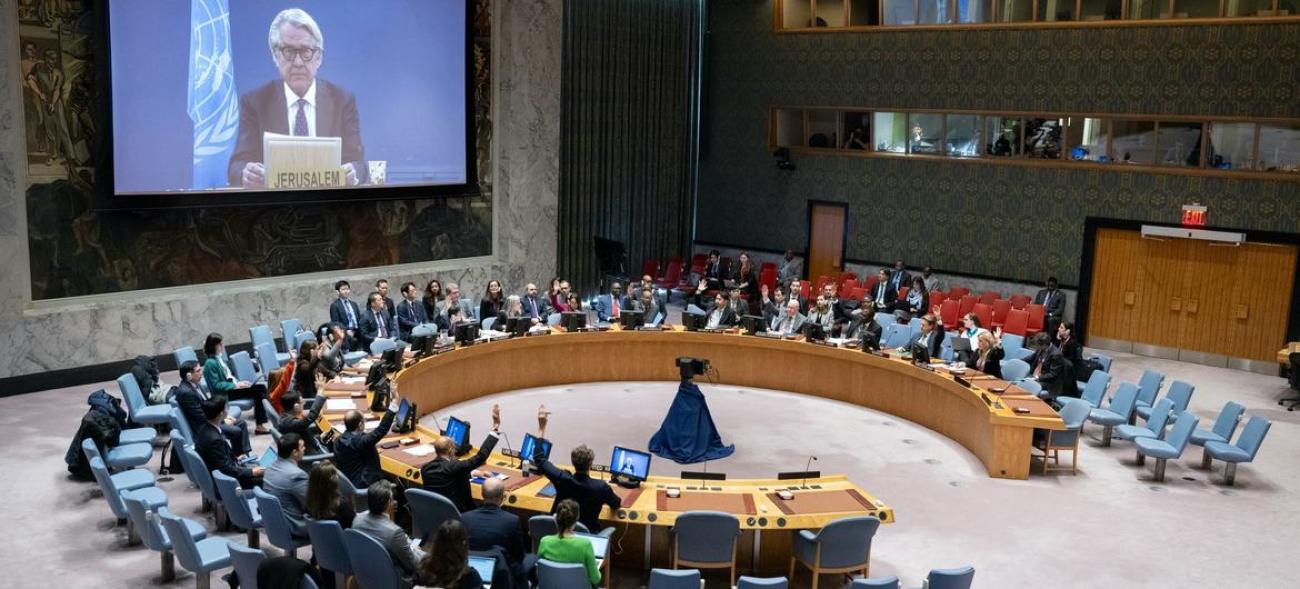UN envoy backs demand for immediate Gaza ceasefire amid ‘cataclysmic suffering’

The UN Special Coordinator for the Middle East Peace Process issued a fervent plea for an immediate humanitarian ceasefire and release of all hostages
The call by Special Coordinator Tor Wennesland followed Monday’s adoption by the Security Council of a resolution “demanding” an immediate ceasefire in the enclave for the remainder of Ramadan, and the immediate and unconditional release of all hostages.
However, intense hostilities have continued between Israeli forces and Hamas fighters, with reports of many killed overnight, including children.
Briefing ambassadors in the Council, he reiterated the UN’s frequent condemnation of the brutal 7 October attacks by Hamas and other groups on communities in southern Israel, stressing that “nothing can justify these acts of terror”.
Immense scale of death, suffering
He said he was “appalled” by the immense scale of death, destruction and suffering wrought by Israel’s military campaign in Gaza, with civilian killings at a rate that is unprecedented.
“Nothing can justify the collective punishment of the Palestinian people,” he emphasized.
“The life-threatening conditions facing the more than 1.7 million internally displaced persons within an ever-diminishing space in Gaza must be addressed immediately. I am extremely concerned by the possible nightmare of more than one million people being displaced again if Israel proceeds with its planned ground operation in Rafah.”
Protect humanitarians
With an “imminent” famine in the north and “horrifying” levels of suffering across Gaza, Mr. Wennesland called on Israel to fulfil its obligations under international law, and facilitate rapid and unimpeded humanitarian access into and throughout the Strip.
He noted that humanitarian work in Gaza is extremely dangerous and that aid convoys continue to face attacks, he stressed that the UN and aid partners must be able to deliver assistance safely.
“This means that humanitarian locations, movements, and workers must be protected more effectively, and that the UN be allowed the equipment it needs to increase staff safety.”
The Special Coordinator also welcomed the opening of a maritime corridor to deliver vital additional humanitarian assistance by sea, but reiterated that “for aid delivery at scale there is no meaningful substitute to delivery by land”.
Alarm over attacks in West Bank
Turning his attention to the occupied West Bank, Mr. Wennesland expressed deep concern over continued violence and casualties, urging Israeli security forces to exercise maximum restraint.
“I am alarmed by attacks carried out by Israeli settlers against Palestinians, including in the proximity of Israeli Security Forces,” he said, adding that attacks by Palestinians against Israelis must also cease.
“All perpetrators must be held accountable.”
Mr. Wennesland also emphasized the importance of upholding the status quo at Holy Sites in Jerusalem, particularly during Ramadan.
“I note that prayers at the Holy Sites have proceeded with some minimal confrontations thus far, and welcome all efforts to preserve calm. All sides must refrain from unilateral steps that would escalate tensions during this sensitive time,” he urged.
Expansion of Israeli settlements
Mr. Wennesland also raised alarm over the relentless expansion of Israeli settlements in the occupied West Bank, including East Jerusalem, and demolition and seizure of Palestinian structures.
“The ever-expanding settlement footprint, including outposts, further entrenches the occupation, while severely impeding the exercise by the Palestinian people of its right to self-determination,” he said, reiterating that Israeli settlements “have no legal validity, and are in in flagrant violation of international law.
The Special Coordinator also voiced concern over the ailing Palestinian economy, calling on the international community to extend fiscal relief to the Palestinian Authority (PA), and on the PA to continue carrying out crucial reform.
Two-State solution
Mr. Wennesland underscored the importance of helping strengthen the PA to enable it to effectively govern.
“Ultimately, any substantial solution for Gaza, and the broader Israeli-Palestinian conflict, is political,” he said.
“It is imperative to set the conditions for an agreed political framework that can outline tangible, irreversible steps towards ending the occupation and establishing a two-State solution – Israel and Palestine, of which Gaza is an integral part, living side-by-side in peace and security, on the basis of UN resolutions, previous agreements, and international law, with Jerusalem as the capital of both States.”

